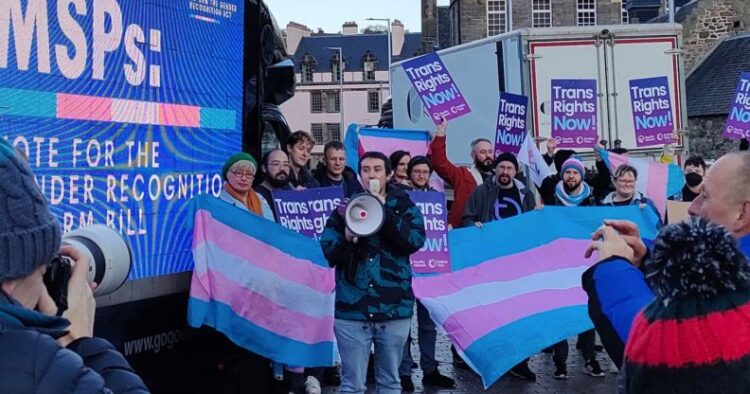By Lucy Caulkett-
A historic gender reform bill has been passed in Scotland, bound to spark further debate as the British public wait to see whether it wil; eventually became law.
Following two of the largest public consultations in the history of the Scottish parliament has managed to get the bill was passed by MSPs on Thursday in a specially extended session.
The Gender Recognition Reform (Scotland) Bill has been passed by 86 votes to 39.
First Minister, Nicola Sturgeon, also accused the Conservatives of trying to delay the legislation after MSPs debate amendments to the Bill late into the night.
The gender recognition reform (Scotland) bill removes the need for a psychiatric diagnosis of gender dysphoria in order to obtain a gender recognition certificate (GRC), and extends the application process to 16- and 17-year-olds for the first time.
Protesters took part in demonstrations both for and against the bill outside Holyrood on Wednesday, as MSPs went through the final amendments.
Alison Johnstone, Holyrood’s presiding officer, announced the result, there were shouts of “shame on you” from the public gallery.
Opponents have raised concerns over its impact on the safety of women and girls, arguing the bill fails to protect women’s rights and single-sex spaces.
Gender dysphoria describes a situation in which someone born as one gender feels uncomfortable with that gender, and wants to change their gender. It has long been a heavily controversial topic in the Uk.
Scotland’s new self-identification system will also reduce the time someone must have been permanently living in their acquired gender before they can apply – from two years to three months, or six months for those aged 16 and 17 – with a three-month reflection period during which an individual can change their mind.
Robison insisted that applying for a GRC under the new system would continue to be “a substantial and significant legal process”, with safeguards strengthened during the passage of the bill, and the bill “doesn’t change public policy … around provision of single-sex spaces and services”.
She told MSPs: “Trans rights are not in competition with women’s rights and, as so often before, we can improve things for everyone when those discriminated against act as allies not opponents.”
The Scottish Conservatives’ equalities spokesperson, Rachael Hamilton, told Robison that her government had not brought the people of Scotland with them, and that “in the rush to make the process a little easier for trans people, the government is making it easier for criminal men to attack women”
The bill passed comfortably with support from the Scottish Greens, Labour and the Scottish Liberal Democrats. Nine SNP MSPs voted against their government, including Ash Regan, the former minister who quit in protest at the first vote.
The social justice minister, Shona Robison, said that, like equal marriage and civil partnership legislation before it, “this is an important step to creating a more equal Scotland”.
At First Minister’s Questions on Thursday, Conservative leader Douglas Ross asked why the Government had not supported an amendment jointly proposed by the SNP’s Michelle Thomson and Tory Russell Findlay.
There will be a further session where MSPs will debate the final version of the Bill.
Ms Sturgeon said the Government had backed other amendments which introduced safeguards to the Bill, but Mr Ross contended these were “weaker” than Ms Thomson’s proposals.
She said that removing the need for medical diagnosis for those who want to legally change their gender is one of the Bill’s key elements.
The need for a medical diagnosis is “one of the most intrusive, traumatic and dehumanising parts of the current system”, she said.
Ms Sturgeon said: “I will never apologise for trying to spread equality, not reduce it, in our country.”
Mr Ross said polling shows the Scottish public do not support the changes the Bill will bring in.
He said: “The public are not against improvements to support trans people, they are against this Bill.
“While there may be a majority in this chamber later today to support this legislation, a majority of the public oppose the Bill.”
Saying the Bill reduces women’s rights and risks their safety, he added: “Let me ask the First Minister, and all Labour, Liberal Democrat and SNP members who support it – Shouldn’t they take the time to get this right, instead of charging ahead with a Bill that the people of Scotland do not support?”
Ms Sturgeon said the last two days have seen 20 hours of debate in a “full and robust” legislative process.
She said: “This is possibly the most scrutinised piece of legislation in the history of this Parliament.”
Tory MSP Sue Webber asked if scenes in Holyrood surrounding the debate on the Bill had “reflected badly” on the Parliament, noting one woman had been “thrown out of the gallery” and another “law abiding woman was threatened with arrest”.
Journalist Helen Joyce -authour of When Ideology Meets Reality- sparked wide protests at Cambridge University last month when she was invited to give a talk about transgender issues.
Her critics said her presence was disrespectful to LGBQ students who were transgender.
The Uk government could still block the bill from gaining Royal Assent.

